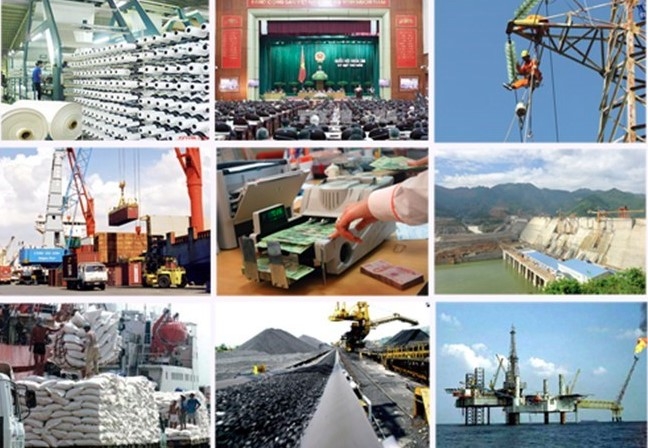Vietnamese economy: International perspectives highlight its global standing
Society – Economy - Ngày đăng : 15:56, 03/01/2025
Positive growth outlook
Leading international financial institutions, such as the World Bank (WB) and the Asian Development Bank (ADB), have continuously raised their forecasts for Vietnam’s economic growth in 2024 and 2025.
According to ADB, Vietnam’s Gross Domestic Product (GDP) growth is predicted to reach 6.4% in 2024 and 6.6% in 2025 thanks to a strong recovery in manufacturing and trade, along with supportive fiscal measures.
Similarly, the WB also raised Vietnam's economic growth forecast to 6.1% in 2024 and 6.5% in 2025.
World Bank (WB) Lead Country Economist and Program Leader for Equitable Growth, Finance and Institutions in Vietnam, Laos and Cmabodia, Andrea Coppola, emphasized that in the context of the global economy facing many challenges such as inflation, geopolitical instability and natural disasters, the Vietnamese economy in 2024 continued to affirm its position as one of the fastest growing economies in the East Asia-Pacific region.
The international community highly appreciates the Vietnamese government's continuous efforts to improve the business environment, which is also of great importance.
Vietnam has effectively leveraged its strategic position as a "bridge" between the two major powers, China and the United States. Thanks to all these factors, Vietnam has been able to attract substantial foreign investment inflows.
Bright spot in investment and technology attraction
In 2024, Vietnam continued to be an attractive destination for international investors. According to the General Statistics Office, foreign direct investment (FDI) disbursement in Vietnam during the past 11 months of 2024 reached US$21.68 billion, an increase of 7.1% compared to the same period last year. This marks the third consecutive year FDI inflows have exceeded the US$20 billion threshold. Sectors such as renewable energy, real estate, and high technology remain top priorities for investors.
In December, Vietnam-briefing.com, a platform by Dezan Shira & Associates, highlighted that in the technology sector, a strategic agreement with NVIDIA to develop artificial intelligence (AI) has solidified Vietnam’s position in the global supply chain. According to Statista, Vietnam's AI market is projected to reach US$753.4 million in 2024, with a compound annual growth rate (CAGR) of 28.36% from 2024 to 2030. This demonstrates Vietnam’s ability to keep pace with global technological transformation, driven by foreign investment.
Key factors contributing to Vietnam's technological growth include its young, dynamic workforce and competitive costs. Vietnam ranks third in Southeast Asia for the number of investment deals and total startup funding.
In recent years, many domestic "unicorn" technology companies and startups have achieved significant success in the field of AI.
An article on Vietnam-briefing.com emphasized that NVIDIA's strategic investment in Vietnam marks a transformative step in the country's journey to becoming a future AI innovation hub in Southeast Asia.
The establishment of two AI centers by NVIDIA in Vietnam, along with partnerships with domestic companies such as VinBrain and FPT Corporation, demonstrates Vietnam's increasingly prominent position in the global AI ecosystem.
Long-term vision
In November 2024, the World Bank (WB) published a report titled "Vietnam 2045: Enhancing Trade Competitiveness in a Changing World – The Path to a High-Income Future," which outlined a roadmap to help Vietnam strengthen its position in the global value chain and achieve its goal of becoming a high-income nation by 2045.
According to the WB, over the past 40 years, global integration has been the primary driver behind Vietnam’s successful development, creating one of the longest and fastest periods of economic growth in modern history.
Currently, Vietnam is among the most open economies in the world, with approximately 50% of its GDP and employment directly or indirectly tied to exports.
Building on its existing successes, Vietnam has set an ambitious goal of becoming a modern, high-income economy by 2045. This requires sustaining an annual per capita GDP growth rate of approximately 6% over the next two decades.
Despite positive prospects, Vietnam still faces several challenges, including risks from climate change, natural disasters, and slowing growth in major trading partners.
The World Bank (WB) recommends that Vietnam invest heavily in human capital, infrastructure, and structural reforms while fully leveraging free trade agreements to expand markets and reduce trade barriers.
Similarly, Shantanu Chakraborty, the Country Director of the Asian Development Bank (ADB) in Vietnam, also stressed that public investment will be the "key" to driving economic growth.
According to him, public investment not only stimulates demand and job creation but also positively impacts dependent sectors such as construction, logistics, and transportation. This will serve as a tool to help Vietnam reduce its excessive reliance on the monetary policy.
The second driver is reform aimed at enhancing business convenience and ensuring that Vietnam maintains its competitive advantages as many other countries in the region invest in building world-class infrastructure.
Shantanu Chakraborty, the Country Director of the Asian Development Bank (ADB), considers these two factors as the main drivers for Vietnam to sustain its development momentum and achieve the growth targets set by the government in the future.

